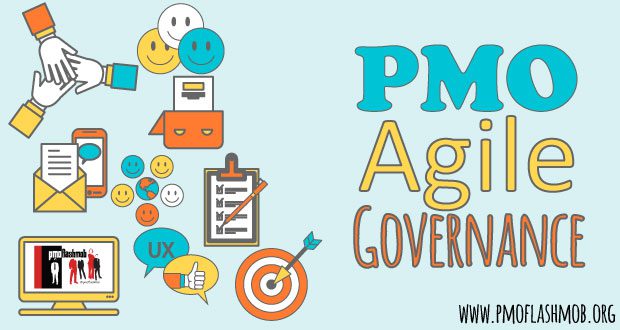Go to article

In October it was the annual Agile Business Conference in London and we asked PMO Flashmob regular Brenda Nombro to go along to the conference to find out more about what the PMO community could learn from the conference. Brenda will be creating a few articles on different presentations she attended.
Here's Brenda to tell you more.
The conference agenda was jammed packed and for every breakout session I could attend, you missed another three, however the first session that I attended on Day 1 was a bit of a no-brainer – How Much is Enough Governance when it Comes to an Agile PMO? from Jonathan Stout from AXA.
It was clearly a topic close to many hearts as the room quickly filled with many standing or sitting around the edges. The presentation wasn’t particularly well delivered and felt very clunky at times. I had hoped for some real practical examples of how the theory becomes practice, but this was lacking and I didn’t get any idea of specific context despite some anecdotal examples. Having said this, there were some points on which I can reflect.
Go to article

Back in June I went along to an event hosted by p3m global to talk about the latest PMO Conference (ended up making a webinar about that here). The evening was all about PMO - specifically about Agile PMO. Before the main evening event we had a roundtable discussion about Agile PMO too (more about the outcomes of that later in the post).
The main speaker for the evening was Chris Davies from DSDM Consortium and he was talking about a subject that I know many people within the PMO are interested in - what services or support does the PMO provide for their organisation's Agile projects? And specifically what needs to happen with governance?
First of all, let's just remind ourselves what governance actually means, I like a lot of Graham Oakes' work and this is lifted from one of his many presentations on governance available via Slideshare:
Go to article
There are many definitions for the programme office. In this presentation, it is: “The decision-making and support group responsible for ensuring that programme goals are achieved. It provides support to the SRO/Executive Sponsor and the programme team.”
Governance is currently one of the most misused terms in the business as it is mainly focused on monitoring and control. Programme governance consists of more than that. The programme office will need to address the three following principles as part of their governance responsibility:
Develop the program vision and objective, based on the business strategy and stakeholders’ needs;
Put in place the right structures and allocating the resources necessary to achieve the vision;
Set up appropriate monitoring and control systems to make the right decisions and realign the program if necessary.
This presentation will examine each of these three streams and explain how to achieve these objectives.
Takeaways:
Understand how program office governance is linked to corporate governance and strategic objectives
Realise, through examples, how these governance principles are applied
Appreciate practical tools and concepts that can be used to achieve governance responsibilities
Go to article
Organisations have been continuously seeking ways to increase the effectiveness and efficiency of their programme and project delivery processes in order to achieve higher return on investment.
PMOs have increasingly played a key role in this trend mostly by ensuring the correct utilisation of project management best practices and by supporting the programme and project delivery processes.
In this scenario, PMOs play a significant role in supporting the utilisation of benefits realisation management practices to ensure programmes and projects maximising the creation of strategic value to the business.
The presentation will focus on some key areas where the PMO can support effective benefits realisation and what many organisations are still finding challenging, which are benefits definition and benefits tracking. The key organisational roles and responsibilities to enable effective benefits realisation will also be discussed as well as the key challenges that organisations face to have benefits realisation management implemented on organisational level.
Takeaways:
How to define a benefit
How to track benefits realisation
What are the key organisational roles for creation of organisational value through effective Benefits Realisation Management
The Video
Go to article
